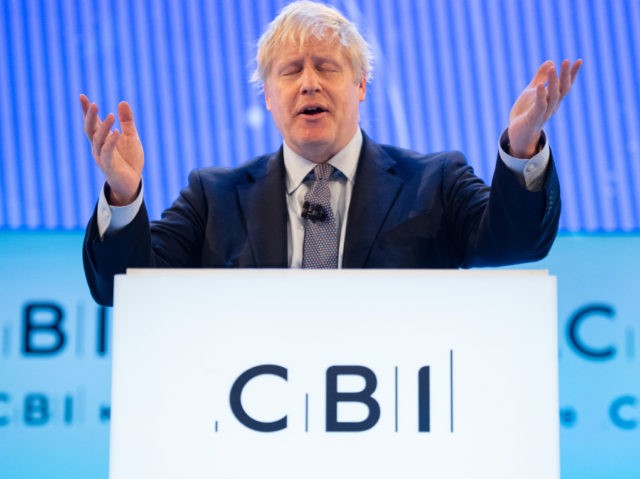Boris Johnson has distanced himself from promised tax cuts during a speech to business leaders Monday, dropping a key element of the Conservative election manifesto, in which tax cuts frequently feature.
The imbalance between pre-election giveaways and new spending rules have left UK Prime Minister Boris Johnson unable to deliver promised tax cuts, he revealed Monday, during an address to the Confederation of British Industry.
The Conservatives had previously promised cuts to corporation tax, personal income tax, and national insurance contributions. The promises on taxing individuals less by increasing the threshold for the higher rate of taxation from £50,000 to £80,000 a year appear to have been quietly dropped, not having been discussed by senior Tories for months.
Now Mr Johnson has said the two per cent cut to corporation tax — a move that he said only this morning would be beneficial to the country and to the government’s coffers — will be postponed. Contradicting his previous remarks that cutting taxes increasing government revenues — a principle of economics known as the Laffer Curve, where less tax burden on businesses allows them to be distinctly more productive, meaning they actually pay more overall tax on their much greater profits in the long run — the Prime Minister told the conference:
The NHS is the nation’s priority, and our priority. And because we believe emphatically in fiscal prudence, I hope you won’t mind if I also announce today that we are postponing further cuts in corporation tax.
And before you storm the stage and protest, let me remind you that this saves £6bn which we can put into the priorities of the British people, including the NHS.
The alternative is Jeremy Corbyn who would whack it straight back up to the highest levels in Europe.
The Tory leader confirmed he would still intend to deliver a number of other, smaller tax cuts, including on business rates — the taxes paid on business premises — employee taxes, and taxes on research, development, and construction.
The U-turn on tax cuts comes after an extraordinary, if not historic spending spree by the Conservatives in the run-up to the election, in which the Conservatives appear to be in a race to the bottom with the big-state Labour party of Jeremy Corbyn. The Chancellor Sajid Javid has already announced an enormous £13.8 billion spending rise for 2020-21, with money for schools, hospitals, police, and other commitments.
The spending boost — which the Conservatives sold to potential voters as the “end of austerity” — is so large that the government has already faced warnings that far from being able to afford budget cuts, the programme of spending would likely require tax rises to cover the costs of the growing state. In a piece published the day before Mr Johnson stood down on corporation tax cuts, the Financial Times reported the Conservatives’ own budgetary responsibility rules would prevent tax cuts after spending promises.
The Conservatives Party achieved a historic milestone this year when the government ran the country on a budget surplus for the first time since the start of the century, a state of affairs once normal in the post-war economy but seen only on a handful of occasions since the mid-1970s. The Conservatives have vowed to keep running the country at a surplus and use the leftover money to pay down the nation’s enormous debts accrued over the past 50 years.
The government’s debt presently stands at £1.8 trillion, or 85 per cent of GDP, having nearly doubled from around one trillion from when the Conservatives took power in 2010.

COMMENTS
Please let us know if you're having issues with commenting.